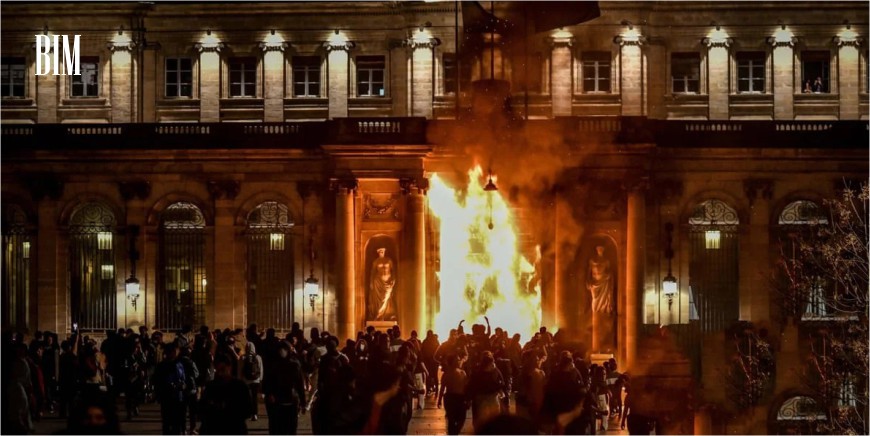When French protests against raising the pension age persisted, the Bordeaux town hall was set on fire.
According to statistics from the interior ministry, more than a million people protested on the streets of France on Thursday, with 119,000 of them in Paris.
80 individuals were detained nationwide, while police in the nation’s capital shot tear gas against protests.
The legislation that raised the retirement age by two years to 64 served as the impetus for the protests.
Next Tuesday’s protests are being planned by the unions to coincide with King Charles III’s state visit to the nation.
He was supposed to be in Bordeaux, in southwest France, where on Thursday night, following a day of protests and skirmishes, the fire burned the town hall’s front door.
The cause of the fire, which was immediately extinguished by firemen, was unknown.
In an effort to allay any worries before the King’s visit, Interior Minister Gerald Darmanin stated on Thursday night that security “poses no difficulty” and the monarch will be “received and welcomed cordially.”
According to the Reuters news agency, police occasionally engaged in combat with masked rioters who broke storefront windows, destroyed street furniture, and attacked a McDonald’s restaurant during mainly peaceful protests in Paris.
Coworkers pulled a police officer who had lost consciousness to safety.
33 individuals were detained in the capital, according to the AP news agency, which also stated that police deployed tear gas and were hit with items and pyrotechnics.
A demonstrator told Reuters, “I reject this change and I particularly detest the idea that democracy no longer means anything.” “We’re fed up because we’re not being represented,”
Another person told the AFP news agency that the only way they could be heard was by demonstrating since “all the other ways…have not permitted us to retract this change.”
Teachers and workers at Paris’s Charles de Gaulle Airport also chose to skip work as a result of the demonstrations, which also interrupted rail service and oil refineries.
The Palace of Versailles, where King Charles and the French president will dine next week, and other well-known tourist destinations including the Eiffel Tower were also closed on Thursday.
A young woman who suffered a major hand injury was observed laying on the ground in the northern city of Rouen. She allegedly lost her thumb after being struck by a police “flash-ball” grenade used to scatter protesters, according to witnesses.
Further fights took place at Nantes, Rennes, and Lorient in the west.
A demonstrator in Nantes said, “The street has validity in France.” If Mr. Macron is unable to recall this historical fact, I am unsure of his purpose at this location.
The day was hailed a success by the labor movement and the political left, but it is unclear where things will go from here.
The administration is counting on a certain amount of momentum being lost. Also, it will be hoped that the violent outbursts would deter people from the protests.
The opposition claims that the protests won’t stop, but unions should come up with a plan rather than just pledging more days like Thursday.
Nine protest days have been held since January, and next Tuesday will be the tenth, according to French unions.
Garbage collectors in Paris have extended their protest against the pension reform to the next Monday. Their first strike began on March 6.
The disturbance is a result of the government’s decision to ram the pension age increase legislation through the lower house of parliament without a vote despite the fact that it does not have an absolute majority there.
Emmanuel Macron, the president of France, supported the action, claiming that the change is essential.
Elisabeth Borne, the prime minister of France, has stated that the adjustments are necessary to save the system from experiencing a significant deficit in the future.

